Creation Stories
of the Middle East
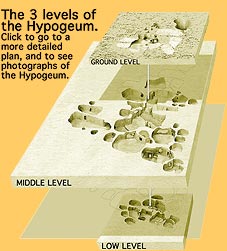 .
.
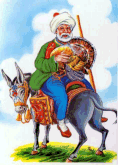 |
.... |
Hoca
Nasreddin (Mullah Nasreddin) has been
the most famous Middle Eastern storyteller who, thru his short and funny
stories, educated many generations of Arabs, Persians, and Turks in topics
varying from smuggling gold to philosophy of life. He was the one who said:
The Truth is relative. It is always your Truth.

|

"When
I had come into being, being came into being, and all beings came into
being, after I came into being” (Ancient Egypt, the Early Ptolemaic
Period).
For
thousands of years people have tried to answer basic questions about origins
of the Universe, ourselves, and rules of engagement, which make our lives
meaningful here, on earth, before the shadow of the Great Unknown descends
on us as unavoidable Death. The Middle East is the only area in the world
where we can observe the development of human thought with regard to issues
of existence and meaning of life for the last five thousand years because
the writing appeared there for the first time in the human history by the
end of the 4th millennium B.C. While number of deities, their names,
attributes, and governing reality have changed or been adjusted in response
to ever-changing environmental, political, economic, technological, and
ideological situation in the region, many themes and concepts have remained
the same. Since nothing has been created in the vacuum after the first
seed of life found its way to the existence, it should not be a surprise
that the most known monotheistic religions of the Middle East -- Judaism,
Christianity and Islam -- base their teachings on the stories recorded
previously in Mesopotamia, Egypt, Syria-Palestine, Anatolia and Persia,
by those who worshipped variety of supernatural forces. However, in order
for the One and Only God to exist, all the others had to “die” and the
concept of religion as an affiliation with an organized ideological movement
was born.
This
presentation introduces an audience to numerous creation stories of the
Middle East, which have shaped our belief systems and, consequently, our
behavior for the last five thousand years. It discusses the “imperfect”
world of ancient deities in which the human beings and their creation were
of no importance other than as servants to often lazy and quite human gods
and goddesses, enjoying their divine lives with not too much regard for
and not much of expectations from their subjects. It shows that once humans
“discovered” their importance and superiority over other creatures of this
earth, and proclaimed themselves to be its masters, their mutual relation
with the divine Master has changed. For better, or for worse…

In
Search of Paradise… Was Dilmun, the Sumerian Paradise, a model for the
Biblical and Qur’anic Garden of Eden? Where should we look for it? The
Iraqis are proud to point out to their traditional Paradise in Al-Qurna,
while many scholars look to Bahrain for its location.
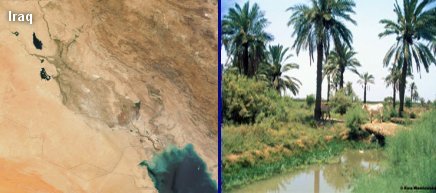
Today,
Iraq is mostly desert but a few thousand years ago, the South looked very
different, full of luscious plant life and sounds of many birds which called
the southern marshes their home. Saddam Hussein purportedly destroyed the
marshes, the center of his opposition.
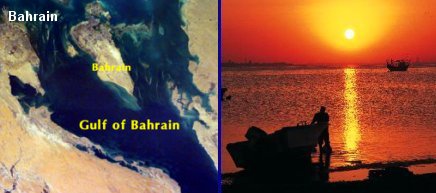
The
sweet and salt waters of the Bahrain coast created a perfect home for Enki,
the Sumerian creator of human beings. Fishing is still quite popular among
the local population although no longer their means of survival: oil is.
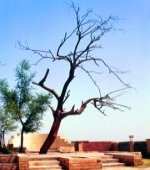 |
.... |
Iraq
This
very dry and old, but not really ancient, tree is believed by the Iraqis
to be the Tree of Life or rather the Tree of Knowledge of Good and Evil
of the Biblical fame. |
| . |
|
|
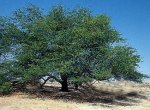 |
|
Bahrain
This
mesquite tree keeps growing although no visible sources of water can be
seen in its surrounding. Even if this is not the Tree of Life, at least
it is still alive. |
|

